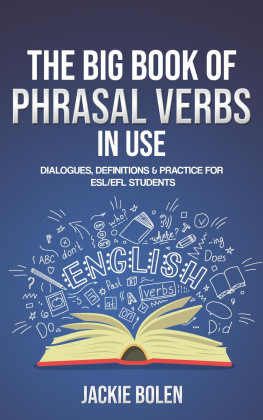The Phrasal Verb Dictionary
OVER PHRASAL VERBS
written by Kevin Peterson
Copyright 2021
All rights reserved. This book or any portion thereof
may not be reproduced or used in any manner whatsoever
without the express written permission of the publisher
except for the use of brief quotations in a book review.
Printed in the United States of America
First Printing, 2021
Contents
Phrasal Verbs A
Phrasal Verbs B
Phrasal Verbs C
Phrasal Verbs D - E
Phrasal Verbs F
Phrasal Verbs G
Phrasal Verbs H -I
Phrasal Verbs J - K
Phrasal Verbs L
Phrasal Verbs M - N
Phrasal Verbs O- P
Phrasal Verbs Q- R
Phrasal Verbs S
Phrasal Verbs T
Phrasal Verbs U- Z
Introduction
Like in most cultures, native English speakers often use informal vocabulary when speaking in normal conversations. Learning the common informal phrases makes it easier, however, students do not realize this until they get to a high level. Colloquial phrases are extremely common in native conversations and are necessary for advanced English.
Phrasal Verbs
Phrasal verbs are the most important collocation because these are commonly used in everyday English. Phrasal verbs include a verb and an adverb or a preposition. If these phrases are not recognized, it can be a problem because phrasal verbs are commonly used by native English speakers. Sometimes, translation devices are not correct when translating phrasal verbs.
The Importance of Phrasal Verbs
Phrasal verbs are very common with native speakers.
To a native speaker, phrasal verbs sound more natural.
Phrasal verbs help English intonation.
Phrasal verbs help focus on the important words.
Phrasal verbs allow faster communication and better rhythm when we speak.
The phrases function as a verb.
Sometimes, the meaning can be different than the verb by itself.
Knowing phrasal verbs is an essential part of the English language.
A phrasal verb is an action that includes a verb and a preposition or adverb. Sometimes, the phrase has a different meaning the individual words.
Normally, the phrasal verb will use a noun associated with the action.
Example: Clean up the kitchen.
clean up (phrasal verb) (a noun)
We will sometimes show the noun as a
something = sth
somebody = smb
Phrasal Verbs
A
Phrasal Verb: abide by
Meaning: to obey, to accept, to agree
Example Sentence: If you dont abide by the law, you can be punished.
Phrasal Verb: account for
Meaning: give a reason for something / be responsible for (sth)
Example Sentence: I hope you can account for the money spent.
Phrasal Verb: ache for
Meaning: have sadness for (sth / smb)
Example Sentence: I ache for the homeless child.
Phrasal Verb: act on
Meaning: follow someone's advice
Example Sentence: You should act on your wife's suggestion.
Phrasal Verb: add on
Meaning: to make an addition / join / combine
Example Sentence: We will add on two new employees to the project's team.
Phrasal Verb: add up
Meaning: make sense / be logical
Example Sentence: The work was ready, but her story did not add up.
Phrasal Verb: adhere to
Meaning: to accept and follow
Example Sentence: It is smart to adhere to the client's demand.
Phrasal Verb: advise against
Meaning: suggest to not do something
Example Sentence: I advise against not following your wife's suggestion.
Phrasal Verb: agree with
Meaning: have the same opinion
Example Sentence: I agree with you about the new movie.
Phrasal Verb: allow for
Meaning: consider (sth) when making plans
Example Sentence: We should allow for extra space in our luggage.
Phrasal Verb: answer for
Meaning: to take responsibility for
Example Sentence: It was your decision so you must answer for the mistake.
Phrasal Verb: apply to
Meaning: relevant or important to (sth / smb)
Example Sentence: Taking the IELTS exam applies to English second language students.
Phrasal Verb: ask about
Meaning: to request information
Example Sentence: Let's ask about the train schedule.
Phrasal Verb: ask around
Meaning: to ask the same question to many people / survey a group of people
Example Sentence: I will ask around the office about the new coffee in the breakroom.
Phrasal Verb: ask out
Meaning: to request to go on a date
Example Sentence: He is too shy to ask her out.





























